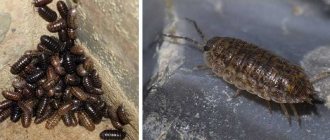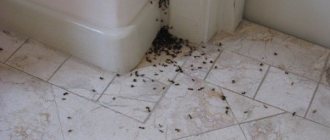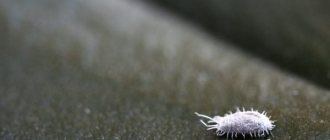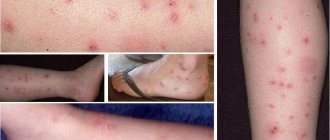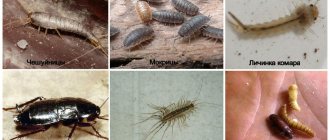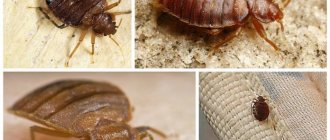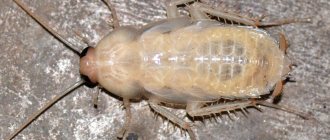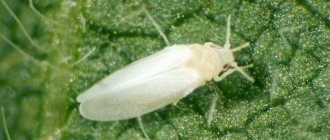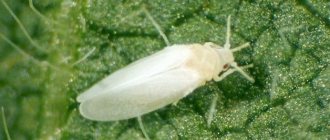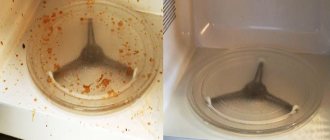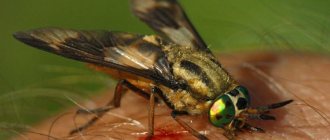Our home is a place where a person spends the main part of the day, when he wants special comfort and relaxation. Various factors can influence the appearance of insects in a human home.
That is why the appearance of uninvited “guests” can bring a lot of trouble. Particularly often insects infect two places in the apartment - the kitchen and the bathroom. The appearance of such living creatures often causes negative emotions and disgust in people; often these pests can be carriers of various infections.
The main difficulty in dealing with such pests is the fact that these insects are for the most part omnivores, which is why they are only happy to live with people under the same roof, where there is a huge amount of food.
Strange white creatures in the apartment, reasons for their appearance
It seems surprising that insects appear in an apartment, because human housing does not belong to their habitat. However, people often notice strange small moving creatures in the toilet or bathroom that quickly run away when a person appears.
The main reason for the presence of insects is dampness; they live where there is moisture and food.
Under what conditions do uninvited guests appear in the bathroom:
- Poor condition of plumbing equipment, leaking pipes and condensation provide a sufficient level of humidity, creating optimal conditions for their habitat and reproduction.
- Ineffective ventilation, the presence of water containers, wet washcloths and constant drying of laundry.
- Lack of sanitary conditions: accumulation of dirty laundry, garbage, wet rags left behind.
Decaying organic matter is the main food source for many insects, so the dirt and disorder that reigns in the apartment provides food for whole hordes of domestic parasites.
Attention! When the home is located on the ground floor, insects enter through the basement. From bottom to top, single specimens move through ventilation holes; when baited, migration becomes widespread.
Where does the attack come from?
There are basically two objective reasons for the appearance of “tenants”:
- various types of communications - woodlice, millipedes, etc. migrate with impunity through ventilation shafts;
- interruptions in the operation of filtration systems, for example, in the tap water there may be small black worms in the bathroom - mosquito larvae.
Mosquito larvae
We create the remaining prerequisites ourselves in pursuit of glamorous design or due to banal laziness, they can be:
- warm water pipes hidden in boxes under the casing; but small-timers will always find a micro-crack to squeeze through to visit you;
- condensation flowing into nooks and crannies under the bathtub that are difficult to reach;
Pandemonium in a wet corner
- damp rugs on the floor near the bathroom/toilet;
- dust;
- clogged drains;
- storage area for rags under the bathroom.
Types of white insects in the bathroom and toilet + photo
Most often the following types of inhabitants are found in the bathroom:
- Silverfish . The body length of the wingless insect is 0.7-2 cm; there are 2 long antennae on the head. The body is flat, tapering towards the end, covered with small scales. The tail is represented by three thin threads extending in different directions. There are yellowish, greenish, transparent and silvery specimens. They move quickly with short stops and become active at night. Silverfish eat foods that contain starch and polysaccharides: wallpaper glue, paper, natural fabrics.
- Woodlice . They belong to the suborder of crustaceans, have an oval jointed body with 7 pairs of legs, 2 pairs of small antennae, one of which is underdeveloped, and externally resemble light beetles. They feed on decaying organic matter of plant origin. They live in damp places, hide during the day, and come out at night to look for food.
- Butterflies . Mosquitoes up to 4 mm long, similar to small moths. The larvae lay in dirty, damp areas and feed on organic debris.
Be sure to read:
How to deal with silverfish in an apartment: TOP 10 poisons and means why they are harmful to humans
Mosquitoes, ants, midges, spiders and even cockroaches can live in the bathroom. But these creatures are known to everyone, it is difficult to confuse them, everyone knows by what means they can be easily destroyed.
woodlouse
One such creature that prefers a humid climate is woodlice. You can see them if you suddenly look into a damp, dark room, as they are nocturnal. White woodlice occurs during molting. Usually this crustacean (which, by the way, many people mistakenly consider to be an insect) has a gray or brown color.
If the room is damp and warm, then this white “insect” will settle in the bathroom quickly and for a long time. Convenient conditions for living and development are the main reason why uninvited guests will choose this place in the apartment. Most often, they settle in places where moisture accumulates: in pipes, as well as where moisture is concentrated or where wet floor rags and rugs are stored.
Many, seeing these creatures, experience a feeling of fear and disgust. By the way, for good reason, because they can carry infections that are harmful to animals and humans. Therefore, when noticing a white insect in the bathroom, it is difficult to experience positive emotions.
Danger and harm to humans
Important! Studies have shown that the nocturnal inhabitants of the bathroom, although unsightly, are not dangerous to people.
The bugs do not bite, do not contaminate food, and do not transmit disease. But if they spread strongly, they can harm people.
Silverfish feed on plant foods rich in protein, sugar and starch, and digest cellulose. They multiply quickly, the female reproduces 70 eggs per clutch, the young individuals, having spread throughout the apartment, settle in the trays of pots of domestic flowers and eat the leaves.
At risk are books, wallpaper, photographs, documents, and excrement can also be seen in food.
Woodlice eat living and decaying plants, and with frequent watering and constant moist soil, they move into flower pots. Here, crustaceans are capable of destroying an indoor flower in 2 weeks, eating the leaves, burrowing into the soil and damaging the root system.
Why are they dangerous and harmful?
In essence, most of the possible inhabitants of the bathroom do not pose a real threat to humans, bringing only psychological discomfort. However, most of them can be carriers of various diseases dangerous to humans. A small part can also bite or sting, which is not only painful, but can also cause the development of allergies.
In any case, you should not ignore the appearance of such living creatures, as they are prone to rapid reproduction and can easily spread to other rooms.
Note! The appearance of insects also precedes the formation of another, not very pleasant problem - mold. It almost always spreads around the room following the living creatures.
The most dangerous is black mold.
Ways to combat woodlice and silverfish
To remove unwanted neighbors from your apartment, you can use several methods:
- apply physical force,
- use traps and bait,
- resort to pesticides.
Everyone chooses the most convenient option based on living conditions, safety and effectiveness of the product.
Attention! Before starting work, it is necessary to carry out a general cleaning of the room, otherwise the work will not bring a positive result. In dirt and unsanitary conditions, it will not be possible to destroy all the individuals; they will multiply and again become an annoyance with their presence.
Physical
The method of physical impact is not an effective option, but if there are few insects and there is no desire to use insecticides, you can try to get rid of silverfish and woodlice using:
- Vacuum cleaner . Remove the brush from the device and go through all the corners and nooks, trying to suck in the parasites and destroy the nests.
- Boiling water . Water is boiled in a kettle and poured from the spout, trying to get to the accumulation of pests.
- Cold . By lowering the temperature in the home as much as possible, the inhabitants of the damp corners are frozen out by the cold.
Be sure to read:
Fleas in the house: how to get rid of them yourself, the best folk and special remedies
The disadvantage of this method is that insects can hide in cracks, sensing an invasion from the outside, or temporarily escape to another place.
Insecticidal
To exterminate insects that appear in the apartment, the store offers a large selection of toxic substances in the form of aerosols or suspensions:
- "Dichlorvos" . A universal drug, suitable for all types of crawling and flying arthropods, crustaceans and arachnids. Available in the form of sprays or solution, which is applied dropwise to hard-to-reach places.
- "Clean house" . Aerosol with a wide range of effects. The advantage of the product is its narrowly directed jet, which allows you to treat cracks and crevices.
- "Taran" . Aqueous concentrate of prolonged action, distributed by spraying, odorless. A single spraying on the surface is enough for one and a half months.
- "Lambda Zone". New generation concentrated suspension, safe for pets. The drug is diluted with water, which allows it to be used over large areas. After spraying, it remains toxic for up to 2 months.
When using poisonous substances against insects in an apartment, do not forget about the safety of yourself and your loved ones.
All manipulations are carried out without the presence of children and animals, spraying must be carried out with gloves, after treatment it is not recommended to enter the room for 3 hours.
Lures and traps
Insects can be eliminated using traps. There are different ways to lure and destroy prey.
The bathroom contains:
- paper, greased with special glue, placed along the path of parasites or along the perimeter of the bathroom:
- structures with poisoned baits.
The methods are easy to use, but the struggle can drag on for a long time.
Important! Silverfish are lured with sugar, it is placed in a glass jar, and the container is left overnight, laid on its side. Those with a sweet tooth will definitely get into it. In the morning the insects are destroyed.
Folk remedies
Moistened birch brooms or rolls of toilet paper are used as traps; moisture will attract woodlice, and soft cellulose will attract silverfish. In the evening they are laid out in corners, thrown away or burned in the morning.
Another method is based on the poisonous properties of boric acid for insects. The powder is scattered under the bathtub or mixed with puree, made into small balls, and placed in secluded corners of the room.
Be sure to read:
How to fight moths in an apartment, where they come from, folk remedies and chemistry
What to do when settling in bristletail
The appearance of these insects in the house (especially in the toilet and bathroom) poses several problems for its owners.
- It's time to repair (adjust) the exhaust system from the bathroom and toilet rooms, and also take measures to dry the entire living space.
- In the kitchen, you should stop accumulating food scraps and unusable supplies; you should also develop the habit of promptly wiping “nutritional blots” for insects from spilled soup, syrup, or jam from the floor.
- It is necessary to ruthlessly remove from the residential area all rubbish that contains soaking sugary and starchy substances and accumulates dust.
- Cleaning the entire apartment using disinfectants should be more thorough and frequent (especially for the toilet and bathroom).
The simplest chemical means for cleaning bathtubs and other hygienic units includes soda, and folk remedies include warm water with mustard powder.
Mustard powder solution
If this is not enough, you can use:
- "Comet";
- "Drop";
- "Pemolux";
- "Pemoxol".
To rid bathrooms and toilets of insects, aerosol disinfectants of the following categories are also applicable:
- "Combat";
- "Raptor";
- Dichlorvos.
An even simpler and most popular method of combating silver-white insects is the use of traps. Soaked bread crumbs and fruit are placed in a glass jar wrapped on the outside with paper.
The process of making a trap for silverfish
Insects that have climbed inside on the smooth glass cannot get out - all that remains is to shake out the jar of silverfish on the street.
Panko trap
This trap is not afraid of high humidity, since its design is closed and the glue is under a plastic cover. To activate the Panko trap, you need to open it and place the bait in the middle.
Panko trap
Then close the trap until you hear a click and place it where the white bugs are likely to appear. As soon as there are too many insects in the trap, it will need to be replaced by installing a new one.
Natural remedies
Alternatively, you can get rid of white bugs using specialized preparations that do not contain toxic chemicals. One such product is Hector silicon dioxide powder.
Hector
The main purpose of this product is to fight bed bugs. But “Hector” is also very good at dealing with white bugs. This is one of the natural and environmentally friendly preparations for eliminating white bugs.
The active component of this powder is silicon dioxide. When the white bugs come into contact with the powder, they lose moisture from their bodies and eventually die.
Hector product (GEKTOR)
The main advantage of Hector is its harmlessness, ease of use and, of course, effectiveness against insect pests. When fighting white bugs, you first need to cut off the tip of the spout on the Hector bottle.
Next, you need to crush the powder in places where white bugs can live or move. And one more thing you need to remember - in a room with high humidity, the product will lose its properties!
Conclusion
This family of insects belongs to the category of protoinsects - aliens from the ancient past of the Earth (appearing on the planet in the Paleozoic - over 300 million years ago).
They perform the role of orderlies not only when living in human habitation - in the humid tropics, by picking up and licking from the soil the remains of decomposed corpses of animals, insects and plants, they bring undoubted benefits to nature.
Centipedes: nods and flycatchers. Insect repellents
Sometimes long, multi-legged, repulsive-looking creatures appear on the floor or walls in an apartment. Usually these are flycatchers or flycatchers - the closest relatives of insects belonging to the class of animals. There is no need to be afraid of them, the creatures are harmless, only in case of danger, the flycatchers emit a pungent odor, and the flycatcher can bite if you pick it up.
Animals live on moist soil, centipedes enter the room by accident or climb into the winter, stay in it for a long time and reproduce if there is moisture, and most importantly, food - cockroaches, flies, butterflies, mosquitoes and silverfish.
To combat invertebrates, physical methods of influence are used; this is enough if the individual appeared in the home by accident. When the population increases, the food source is eliminated: insects living in the apartment. Boric acid or any insecticides are also used.
Attention! Centipedes are afraid of red peppers. It is scattered in powder form indoors.
Silent occupation
A bathroom is a specific room with a high level of humidity, located in the dark most of the day. Such conditions are ideal for small crawling and running animals, for which everyone often creates favorable conditions with their own hands.
Dragons will soon live here
If you Google it, you will be surprised to learn that crustaceans and even animals may also be scurrying around under your feet! Let's look at the most typical bathroom troublemakers:
- silverfish are primarily wingless insects from the bristletail order;
- woodlice - a class of higher crayfish of the order of isopods;
- nods - invertebrates from the order Centipedes;
- centipedes are arthropods considered to be the closest relatives of insects;
- mosquitoes are insects from the order Diptera;
- Tubifex - class zonalis, subclass oligochaetes.
Silverfish
Small white worms in the bathroom, at first glance, turn out to be elegant insects up close - sugar silverfish up to 2 cm long, with a characteristic teardrop-shaped body and three tail processes. Not being predators by nature, they can cause significant damage to wallpaper, linen, and books (think about it, fans of newspaper racks in the bathroom).
Sugar silverfish
It also feeds on mold and fungi that grow only in a humid environment, so the appearance of sugar silverfish should alert you . The insect does not hibernate, but diligently reproduces, laying about 70 eggs in June-July.
The habit of hiding in the natural environment under stones, sticks, and in the leaves of a sugar bowl is also retained in the bathroom, cleverly being buried:
- in crevices;
- under peeling paint;
- under the bathtub, basins;
- in caked underwear.
Preferring darkness, silverfish rush in different directions as soon as a bright light comes on. However, on glazed tiles their speed decreases sharply, and if they get into a puddle or even a drop of water, they stop altogether.
Kivsyaki
Living in natural conditions, mostly underground, it appears by chance in the fallen leaves in the bathroom. Thanks to their smooth body, they look like worms in the bathroom, although specimens up to several centimeters in length make them look like snakes.
Demo version of kivsyak
The body of the centipede is covered with a chitinous layer, which does not prevent it from curling up smartly in case of danger. The “worms” move quite slowly, you can simply pick them up with your hand and take them outside, especially since they process plant residues well.
Woodlice and mosquitoes
These creatures, as a rule, appear by chance - woodlice, usually rise from the basement or ventilation ducts and quickly leave if the humidity is low. If these crustaceans stubbornly refuse to leave, most likely a pipe is leaking somewhere, creating favorable conditions for their residence.
Woodlice look like miniature armadillos - they curl up into a tight ball when touched; they are gray on top (juveniles are light-colored) and have a whitish belly. May cause harm:
- indoor plants;
- to humans, because they are carriers of fungal pathogens, depriving.
Woodlice portfolio
Mosquitoes fly into the bathroom, mainly if there is stagnant water in some container or there is no mosquito protection on the windows. They cannot reproduce here because the larvae must develop in stagnant water.
flycatcher
What is capable of inspiring horror is this fast-moving (40 cm/sec), silent arthropod, appearing out of nowhere and smoothly “flowing around” obstacles. The abundance of long legs and the longest mustaches are frightening, which can be confused with the same long hind legs - just pull and push.
If you remain neutral, the centipede can thoroughly clean your apartment and destroy:
- flies;
- fleas;
- cockroaches;
- spiders and so on.
European scolopendra species are not poisonous, although the bite (if it is strong enough to bite through the skin) will be akin to a wasp sting. If the very thought of such a neighbor is unpleasant to you, you can, of course, use a slipper, or else you can catch it in a jar and take it out of the house.
In the photo there is an insect flycatcher and a cat flycatcher
Real worm
The real little worms in the bathroom are tubifex worms, also from the category of random visitors and can appear in the bathroom, the water for which is pumped from a pond. The tubifex looks like a thin thread of dark pink color and is familiar in everyday life as food for fish.
In ponds, worms accumulate in huge colonies in polluted places, in silt, so the chance of getting into the water supply system is one in a thousand. If a worm appears in the sink, it can be fed to aquarium fish or washed off quietly.
Pipe makers
Find the good in the bad
Since you have to coexist (temporarily, of course!) with boogers, you are still lucky, because these creatures:
- not aggressive;
- not poisonous;
- in some cases it is beneficial (flycatchers, remember?);
- does not form large colonies;
- signals that your bathtub needs a major “technical inspection”.
Preventing insects from appearing in the bathroom
Preventative measures will help reduce the likelihood of various insects infesting the bathroom.
To comply with hygiene requirements and reduce humidity, it is recommended to carry out the following measures:
- keep the bathroom clean using disinfectants,
- remove unnecessary things, regularly take out the trash,
- check the operation of the hood, if it is necessary to clean the ventilation hole,
- ventilate the room after washing and water procedures,
- install a heated towel rail in the bathroom,
- periodically check the pipes for leaks, if problems are detected, immediately call a plumber,
- carry out renovations in the apartment, seal cracks in the walls and baseboards,
- Store sugar and flour products in containers or tight bags, and immediately remove spilled crumbs.
To repel insects, pour a powder consisting of 4 parts chalk and 1 part boric acid under furniture and bathtubs. Pests are afraid of the aromas of fragrant plants: lavender, tansy, rosemary, wormwood.
Important! In the fight against parasites, you cannot cope alone; you need to involve your neighbors: then you have a better chance of getting rid of unpleasant creatures in the house for a long time.
How to remove insects
If you noticed silverfish in the bathroom, how to get rid of it immediately so that the problem does not become global in the future? It is believed that insects are very difficult to remove. But it is still possible.
Forced ventilation in the bathroom can help you with this. With it, it will be possible to regulate the level of humidity, as a result of which it will be more difficult for uninvited guests to stay without the necessary conditions.
Comfortable living temperature for silverfish is 21-27 °C. Therefore, it is necessary to reduce the temperature in the apartment. This can be done through ventilation.
In this case, all hard-to-reach places must be cleared of dust, and wet corners and other damp areas must be thoroughly dried. In addition, the apartment should be cleaned using chlorine-containing substances to ensure disinfection.
